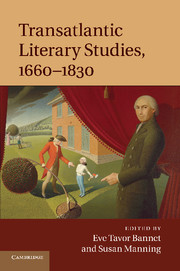Book contents
- Frontmatter
- Contents
- Notes on contributors
- Acknowledgements
- Introduction: British and American genres
- Chapter 1 Transatlantic books and literary culture
- Chapter 2 Transatlantic utopianism and the writing of America
- Chapter 3 Tales of wonder, spiritual autobiographies, and providence tales
- Chapter 4 Life writings
- Chapter 5 Benjamin Franklin and transatlantic literary journalism
- Chapter 6 Theatre, drama, performance
- Chapter 7 Transatlantic American Indians
- Chapter 8 Literature of the ocean
- Chapter 9 “To gird this watery globe”
- Chapter 10 Ghostly and vernacular presences in the black Atlantic
- Chapter 11 Susanna Rowson and the transatlantic captivity narrative
- Chapter 12 Domestic fiction and the reprint trade
- Chapter 13 Transatlantic Gothic
- Chapter 14 Transatlantic Romanticisms
- Chapter 15 Journeys of the imagination in Wheatley and Coleridge
- Chapter 16 Transatlantic historical fiction
- Further reading
- Index
- References
Chapter 6 - Theatre, drama, performance
Published online by Cambridge University Press: 05 January 2012
- Frontmatter
- Contents
- Notes on contributors
- Acknowledgements
- Introduction: British and American genres
- Chapter 1 Transatlantic books and literary culture
- Chapter 2 Transatlantic utopianism and the writing of America
- Chapter 3 Tales of wonder, spiritual autobiographies, and providence tales
- Chapter 4 Life writings
- Chapter 5 Benjamin Franklin and transatlantic literary journalism
- Chapter 6 Theatre, drama, performance
- Chapter 7 Transatlantic American Indians
- Chapter 8 Literature of the ocean
- Chapter 9 “To gird this watery globe”
- Chapter 10 Ghostly and vernacular presences in the black Atlantic
- Chapter 11 Susanna Rowson and the transatlantic captivity narrative
- Chapter 12 Domestic fiction and the reprint trade
- Chapter 13 Transatlantic Gothic
- Chapter 14 Transatlantic Romanticisms
- Chapter 15 Journeys of the imagination in Wheatley and Coleridge
- Chapter 16 Transatlantic historical fiction
- Further reading
- Index
- References
Summary
In examining the history of theatre and drama during this period, a scholar would find it nearly impossible to avoid transatlanticism. Nevertheless, the national focus of most critical and historical writing on literary texts has precluded serious efforts at comprehending both European and North American performance arts for the late seventeenth to early nineteenth centuries in light of the cross-oceanic reality of theatrical culture. To be sure, in the sheer volume of British playwriting for the period, one can more easily avoid invoking the transatlantic than one can with American writing; but even so, both dramatic literatures and performance practices reflect a bi-continental reality in the exchange of news, actors, practices, texts, and commodities (including bodies) as well as dramatic properties. Theatre, drama, and performance on both sides of the Atlantic richly interfuse not only each other but also transatlantic culture as a whole.
Although there is not a significant theatrical presence in the English colonized New World until after 1700, many plays on British stages reflect knowledge of or interest in North and South American settings or characters. One need look no further than The Tempest (1611) to find Shakespeare's use of colonial material in his fanciful, West Indian-seeming island and in his native figure, Caliban, based upon accounts reaching England concerning the wreck of a supply ship in the “still-vexed Bermoothes.” Later variations on The Tempest, including John Fletcher's Sea Voyage and Durfey's Commonwealth of Women, suggest the continuing potency of the colonial theme and its exoticism to seventeenth-century British audiences. Other plays in the Stuart period focus on individual events or personages, including Captain John Smith, the transatlantic explorer, who complained that he and his adventures were being mocked on the English stage. By the time of the Restoration, the enhanced stagecraft of the period made possible elaborate productions of American situations, with such costume epics as Dryden and Howard's The Indian Emperor and Dryden's The Indian Queen gracing London boards. By 1680, with permanent colonies and more active trade between the British Isles and North America in place, references to New World personages and situations had become more or less commonplace. One example in a play not otherwise noted as a colonialist drama is an exchange in Thomas Otway's The Atheist (1683), a text set in London. The protagonist, Beaugard, has been led to a mysterious location in London, when he is encountered by two women of color. His first thought is that he has been transported to Captain Smith's Virginia: “What are you two, Maids of Honour to the Queen of Pomonkey? And is this one of her Palaces?” Although The Atheist was never acted in North America, nor Otway ever resident in the colonies, that the main character refers to a colonial situation already over a half-century out of date hints at the power of American scenes for English dramatists writing in and about London.
- Type
- Chapter
- Information
- Transatlantic Literary Studies, 1660–1830 , pp. 91 - 105Publisher: Cambridge University PressPrint publication year: 2011



